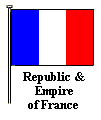
La Marseillaise

 | |
|
Allons enfants de la Patrie Le jour de gloire est arrivé. Contre nous, de la tyrannie, L'étendard sanglant est levé, l'étendard sanglant est levé. Entendez-vous, dans les campagnes. Mugir ces féroces soldats Ils viennent jusque dans nos bras Egorger vos fils, vos compagnes. Aux armes citoyens! Que veut cette horde d'esclaves Aux armes citoyens! Quoi ces cohortes étrangères! Aux armes citoyens! Tremblez, tyrans et vous perfides Aux armes citoyens! Français, en guerriers magnanimes Aux armes citoyens! Nous entrerons dans la carrière Aux armes citoyens! Amour sacré de la Patrie, Aux armes citoyens! |
Let us go, children of the Fatherland To arms, citizens! What do they want this horde of slaves To arms, citizens! What! These foreign cohorts! To arms, citizens! Tremble, tyrants and traitors To arms, citizens! Frenchmen, as magnanimous warriors To arms, citizens! We shall enter into the pit To arms, citizens! Sacred love of the fatherland To arms, citizens! |
Intended as a "war wong," the Marseillaise is extraordinarily bloody in its imagery, but I have never heard of any movement to replace it as being too violent, as there is occasional talk in the United States that The Star-Spangled Banner is too war-like. It is now certainly unthinkable that anything but the Marseillaise should be the French national anthem.
Slightly different versions of the song appear on the Internet. In the first verse, I see both "dans nos campagnes" and "dans les campagnes." Also, "ces farouches soldats" occurs for "ces féroces soldats." Since "féroce" is much more like the word in English, my suspicion is that "farouche" may be the original term. There are also occasionally questions about the translation. "Compagnes" means "female companion, consort, partner, mate," any of which makes for a somewhat awkward translation. "Compagnon" would have been just "companion" or "comrade," but I haven't seen that yet. My choice is "companion," which covers "compagne" but is not so specific. In the sixth verse there is "la carrière," here translated as "pit." This makes it sound like an image of hell, but the word simply means "quarry." And there is the problem. "La carrière" has another meaning, "race-ground, course, career, life, profession, etc." This could be more like the intended meaning, but it is hard to tell.
  | |
|
Deutschland, Deutschland über alles, Deutsche Frauen, deutsche Treue, Einigkeit und Recht und Freiheit |
Germany, Germany above all Above everything in the world When, always, for protection and defense Brothers stand together. From the Maas to the Memel From the Etsch to the Belt, Germany, Germany above all Above all in the world. German women, German fidelity, Unity and justice and freedom |
Originally called Das Lied der Deutschen (or Das Deutschlandlied, "Song of the Germans/of Germany"), the common title is just from the first line of the song. It originally meant, therefore, the unity of Germany over all its existing divisions, not the triumph of Germany over everyone else. The music was taken from the String Quartet in C major (the Kaiser-Quartet), Op. 76,3 of Joseph Haydn, composed in 1797.
Although a unified Germany was later brought about by Prussia, Deutschland über Alles nevertheless was never the national anthem of the German Empire, perhaps because its anti-monarchist origins were well remembered. At the same time, that explains better why the song was adopted as the anthem by the Weimar Republic in March, 1922. Like German nationalism itself, the meaning of the song was then transformed by darker forces. Hitler certainly did want Germany to be "over all" other nations and to dominate the world. But again, Deutschland über Alles was not the favorite song of the Nazis -- that was the Horst Wessel Song. In post-war Germany, the old meaning for the first verse was completely ruined, but the third can still be used as appropriate to the modern state.
 God Save the Queen |
|
God save our gracious Queen, O Lord our God arise, Thy choicest gifts in store Not in this land alone, From every latent foe, |
Since the song was a personal tribute to the Sovereign, and not necessarily a national song, there came to be parallel versions with the same music, to their respective monarchs, in Prussia, Denmark, Russia, and Liechtenstein. Indeed, during the German Empire, the Prussian version was still being used as the unofficial national anthem. What everyone thinks of as the German national anthem, Deutschland über Alles, had no official recognition until 1922. The version in Liechtenstein is still used there.
| My Country, 'Tis of Thee |
|---|
|
My country, 'tis of thee, |
The tune has also been used for songs in countries that are not monarchies, like Switzerland and the United States. The American version, My Country, 'Tis of Thee, was written by Samuel F. Smith in 1831.
God Save the Queen remains a personal song to the monarch in the Dominions where the Queen of England is still the Head of State but which have all, by now, adopted their own national anthems, i.e. God Defend New Zealand (1940, in English and Maori), O Canada! (1980, in English and French), and Advance Australia Fair (1984, but everyone knows that Waltzing Matilda is the real Australian national anthem).
 Rule Britannia |
|
When Britain first, at heaven's command, Rule Britannia! Britannia rule the waves. The nations not so blest as thee, Rule Britannia! Britannia rule the waves. Still more majestic shalt thou rise, Rule Britannia! Britannia rule the waves. Thee haughty tyrants ne'er shall tame, Rule Britannia! Britannia rule the waves. To thee belongs the rural reign, Rule Britannia! Britannia rule the waves. The muses still, with freedom found, Rule Britannia! Britannia rule the waves. |
The song began with a poem, "Rule Britannia," by James Thomson. It was put to music by Thomas Augustine Arne and was first performed in 1740. Britain had just gone to war with Spain, the war of "Jenkins' Ear" -- Captain Jenkins supposedly had had his ear cut off by the Spanish. This conflict soon was part of the larger European War of the Austrian Succession. Britain was not at this point dominant at sea, but that was in the works.
Although the revolutionary era is some years in the future, it is curious how this song puts emphasis on freedom and tyrants, as well as commerce, wealth, and greatness. Especially prophetic seem the lines "more majestic shalt thou rise, from each foreign stroke." This was certainly the case with the wars of the 18th century, and especially after the epic struggle against Napoleon. From the terrible wars of the 20th century, however, Britain was less lucky. Staggered by World War I, Britain, although victorious, no longer possessed the supremacy it had had. World War II, a far more desperate fight, left Britain, although again victorious, no longer a power of the first rank -- that was now the "superpowers" of the United States and the Soviet Union. Most conspicuously, the Royal Navy was no longer the master of the seas.
In time, the British retreat into insularity was so great the Argentina was tempted to seize the Falkland Islands (1982), expecting that Britain no longer had the resources or the will to take them back. Big mistake. The successful ejection of the Argentines, however, could not conceal one awkward truth: Britain had been on the verge of decommissioning all her aircraft carriers. The absence of air support would have the Falklands campaign difficult to impossible.
In truth, however, the Royal Navy was the greatest navy of history, and its rule of the waves the most benevolent and beneficient, let alone most universal, of any power ever. Britain was envied for her colonial possessions, which were seen as the source of her power; but it is clear now that this was of limited economic value. Britain was strong from having an entrepreneurial tradition and a free and open market, to an extent that no country in the world has today. Indeed, countries are always worrying about "protecting" themselves. At its height, Britain knew that free trade was its best protection.
 Star-Spangled Banner |
|
Oh! say, can you see, by the dawn's early light, On the shore, dimly seen thro' the mist of the deep, And where is that band who so vauntingly swore, Oh! thus be it ever when freemen shall stand |
It was many years before the song had any official status. It quickly, however, gained a certain importance. For instance, it was sung in 1865 at the ceremony when the United States flag was officially rehoisted over Ft. Sumter in Charleston harbor -- where, of course, the Civil War had begun with a Confederate bombardment. Later, the song achieved semi-official status in the usage of John Philip Sousa, conductor of the Marine Corps Band from 1880 to 1892 and thereafter involved with both the Army and Navy music programs -- not to mention composer of immortal marches like The Stars and Stripes Forever. Just before Sousa's death in 1932, Congress officially adopted The Star-Spangled Banner as the national anthem (1931).
The original flag from Fort McHenry is displayed in the Smithsonian Institution (half of it, indeed, was shot away); and flags are kept flying day and night over the Fort itself, and at Francis Scott Key's grave.
The major complaint about the song is that it is just hard to sing. The match between the words of the poem and the music is a little awkward. When done well, however, and countless artists have had their chance at the World Series, the Super Bowl, and political conventions, it is powerful and moving. Another complaint has been its warlike images. These, however, pale beside the Marseillaise, which doesn't seem to receive such criticism. Only the third verse, which no one seems to know or sing, even mentions blood, which is actually in the chorus of the French anthem.
The fourth verse contains other important phrases. "Freemen shall stand between their loved home and the war's desolation" is memorable and occasionally repeated. A version of "In God is our trust" even ended up on American coins ("In God We Trust") -- Salmon P. Chase, Lincoln's Secretary of the Treasury, put it there during the Civil War.
The occasional suggestion that something milder, or more touchy-feely, be made the national anthem unfortunately seems to come from people who do not always seem to have the right idea about America, like Ted Turner, who is a fan and apologist for Fidel Castro.
The national anthem is now a touchstone of anti-Americanism, when millionaire professional football players, supposedly to protest police brutality, began knealing, rather than standing, during the playing of the anthem. This drew fury from many Americans, but has been reinforced in 2020 by further campaigns, now simply against the police, rather than just "police brutality." That the Democratic Party has become openly anti-American, has increased the stakes. Protesting the anthem, and the flag, now means protesting the very existence of the United States of America, which was evil from the day the first slaves arrived in 1619. All this, of course, is simply a mask for Marxism. The ideal of "Progressives" is Venezuela, Cuba, and China, and all the screaming about "systematic racism" is just a substitute for screaming about capitalism. This is what American "education" has now taught for many years.
The National Basketball Association and its players, who make substantial money in China, have praised Communist China, avoided issues like its genocide against Tibetans and Uighurs or its illegal suppression of Hong Kong, and have even sanctioned its own employees who criticized China or expressed support for democracy in Hong Kong. Perhaps the NBA and all its players should just move to China and forget about America. They might be happier. Entire teams in basketball and baseball have now decided not to stand for the national anthem. Since fans cannot attend games anyway, because of the Corona Virus, there should simply be a boycott of all the sports that refuse to respect America.

John Brown's Body, and
The Battle Hymn of the Republic
 Body |
|
John Brown's body lies a-mouldring in the grave, Glory, glory Hallelujah, glory, glory Hallelujah, He captured Harper's Ferry with his nineteen men so true, Glory, glory Hallelujah, glory, glory Hallelujah, He's gone to be a soldier in the army of the Lord, Glory, glory Hallelujah, glory, glory Hallelujah, John Brown died that the slave might be free, Glory, glory Hallelujah, glory, glory Hallelujah, Now has come the glorious jubilee, Glory, glory Hallelujah, glory, glory Hallelujah, |
John Brown was the sort of Abolitionist to whom "by any means necessary" would have been an agreeable sentiment. He eagerly joined the mutual massacres in "Bloody Kansas" in 1855, to prevent the territory from voting for slavery. He lost the vote, but Congress rejected the petition to admit Kansas as a Slave State. More dramatic yet was his attempt in 1859 in seize the Federal Arsenal at Harper's Ferry, Virginia, and spark a slave revolt. This was even less successful than his Kansas adventures, and he was captured by, of all people, Colonel Robert E. Lee. Tried for treason and hung, Brown became more successful as a martyr to Abolitionism than he ever had been in his violent projects.
The tune of the song was from an old camp meeting or revival song -- Say Brothers Will You Meet Us? The origin of the actual words is lost in battling legends.
On May 28, 1863, the Massachussetts 54th Regiment, the first black unit in the United States Army, paraded in review in Boston, singing John Brown's Body. As a matter of fact, John Brown lies, with several of his fellow Harper's Ferry conspirators, in graves on his own farm, just outside Lake Placid, New York.
 of the Republic |
|
Mine eyes have seen the glory of the coming of the Lord: Glory! Glory Hallelujah! Glory! Glory Hallelujah! I have seen Him in the watch-fires of a hundred circling camps, Glory! Glory Hallelujah! Glory! Glory Hallelujah! I have read a fiery gospel writ in burnished rows of steel: Glory! Glory Hallelujah! Glory! Glory Hallelujah! He has sounded forth the trumpet that shall never call retreat; Glory! Glory Hallelujah! Glory! Glory Hallelujah! In the beauty of the lilies Christ was bom across the sea, Glory! Glory Hallelujah! Glory! Glory Hallelujah! |
As the battles of the Civil War became increasingly terrible, all began to feel that only Divine Intervention would settle the matter. The Battle Hymn became the most famous and durable version of the Union Appeal to Heaven.
Return to "Abortion"
 Waltzing Matilda |
|
Once a jolly swagman camped by a billabong, Who'll come a-waltzing Matilda my darling, Down came the jumbuck to drink at the water-hole, Who'll come a-waltzing Matilda my darling, Up came the Squatter a-ridding his thoroughbred, Who'll come a-waltzing Matilda my darling, The swagman he up and he jumped in the water-hole, Who'll come a-waltzing Matilda my darling, |
The language of the song contains a number of perplexing dialect terms. The "swagman" is an itinerant sheep shearer. His "swag" is his bedroll and other possessions. A "billabong" is pool of water from a dried up creek or stranded oxbow pond. These are common enough in Australia, a relatively dry land, that the Australian lungfish are adapted for them: when the oxygen in the water is depleted, the fish can breath the air. A "coolibah tree" is eucalyptus, now nearly as familiar in California as in Australia. A "billy" is tin can used as a cooking or tea pot. A "jumbuck" is a sheep. A "tucker-bag" is understandable from American usage, where "tucker" is "food." A "squatter" would be something like a homesteader in the United States, where "squatter" itself is used more for trespassers. The "troopers" are mounted policemen, and some versions of the song simply say "policemen." "Waltzing Matilda" means to travel around as the swagman does, with "waltz" borrowed from German immigrants, with perhaps a double entendre involved, as "waltz" can also be a dance. "Matilda" either is a proper name for the swagman's bedroll, or a general term, dating all the way back to the Thirty Years War, it is said, for camp followers or the bedrolls and blankets that perforce took their place.
Thief or no, the swagman clearly has a hard life, sleeping in the open and cooking over his fire; and Waltzing Matilda clearly evokes the harsh life of the early transported convicts, and later difficulties in Australian life, like grim experiences in World War I and II. It is thus a great song, not just of Australian, but of human life.
While Matilda did quite well in the vote for Australia's national anthem, many Australians seem to be embarrassed by its sentiments, as I have heard from the occasional correspondent who is indignant at the attention that I have given to it. I can only wonder if these are the people responsible for things like the legal requirement to vote, the confiscation of firearms, and the poor protections for free speech. I understand that simply repeating the Biblical condemnation of homosexuality can result in legal penalties. Such things are a sad testimony to what has happened to what Jefferson called the "spirit of resistance" among the people. Waltzing Matilda represents a great deal more of the spirit of resistance than what now seems typical in Australia, and it is thus a shame that it does not have even more of the status than it does.